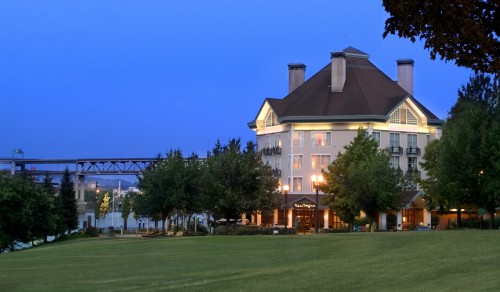
On Thursday, October 6th, 2016, the Cornell Baker Program’s Distinguished Speaker Series stage was once again graced with a wealth of experience and lively discussion. Cornell alum Ben Rowe engaged the audience with his approach to value creation and property evaluation, as well as his take on disruption in hospitality. Ben Rowe is a Founder and Managing Partner of KHP Capital Partners, a real estate private equity firm focused on investments in boutique and independent hotels. Ben’s presentation focused on doing smart deals at the asset level, and touched a number of subjects that the Baker Program’s curriculum focuses on.
Ben generously shared KHP’s approach to creating value. The company’s firm adherence to their investment principals has set them apart, as the leadership team ensures that every investment is made within the framework of: being value-add and well located, having asymmetrical risk, having limited competition, being acquired at a discount to replacement cost, and utilizing moderate leverage. Standing by these principals has enabled Ben and KHP to create value that is not dependent on market growth, and make investments that are insulated from market risk.

Ben’s wealth of experience in hospitality was evident as he discussed the way in which he evaluates assets and how he looks at opportunities to add value. For example, he approaches hotel amenities with a community customer-base in mind. Taking the approach that developing amenities for the community as a whole will result in a better amenity for hotel guests. In one of KHP’s case studies, the project’s rooftop bar went on to become one of the most successful bars in the area. Matthew Kenny (Baker ’18), when reflecting on the day, shared that “finding ways to develop at a discount” was one of his takeaways from Ben’s visit. The creative approaches that KHP takes with adaptive reuse projects allows the company to develop at a discount to replacement cost, as opposed to paying a dollar for a dollar when developing ground-up.
The Baker program has recognized, and embedded into its curriculum, the growing importance of statistical modeling in real estate. Ben’s visit confirmed the program’s alignment with the industry, as he discussed the importance of seeking asymmetric risk. When making an investment decision, KHP will model around a dozen scenarios, which are based largely around a discussion of upside and downside. Industry norms often base decisions around the most likely case. KHP takes a more statistical approach to scenario analysis, focusing on the mean of outcomes as opposed to simply the most likely.

The hospitality sector has been a classic example of industry-wide disruption. Robert Lathan (Baker ’17) asked about Ben’s perspective on the threat of disruption in the industry – ranging from incremental changes such as Online Travel Agencies (OTAs) to the transformative force of Airbnb. Ben spoke about how the fragmented nature of the industry makes it difficult for hotel owners and operators to move in cohesion, though the Starwood/Marriot merger may create a group with enough cache to influence the industry. Rather than Airbnb, which lowers average rental rates at peak times but mostly threatens lower-end hospitality services, the larger threat to KHP’s properties is the current rules – or lack thereof – around rebooking. The Baker students interested in hospitality were given some reassurance when Ben noted that hotel occupancy is at its peak since the early 1980’s, and that’s including Airbnb’s impact on market supply.
